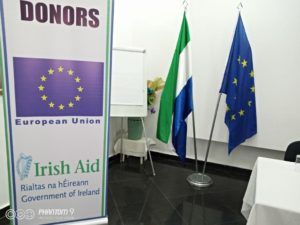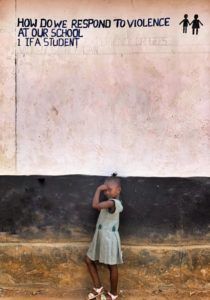 Stories
Stories
September 14, 2020 • 5 min read
The plan is in response to a report which reveals alarming levels of children working in hazardous conditions.
By Kevin Naughton
GOAL has launched an action plan to tackle the problem of the worst forms of child labour in Sierra Leone following a study which reveals more than two thirds of children aged between five and 17 years are engaging in work, including transactional sex.
The study, funded by the EU and Irish Aid and undertaken by GOAL in conjunction with World Hope International (WHI) and the Sierra Leone Labour Congress, found that child labour remains common in Sierra Leone with weak protections for those aged under 18.

This study was funded by Irish Aid and the EU.
It revealed that children are often sent out to work by families struggling financially and in need of additional income, and children from dysfunctional homes are trafficked and get involved in commercial sex.
The research conducted amongst 1,323 children aged between five and 17 years in 700 households across Sierra Leone revealed that:
- 71% of children are engaged in at least one child labour activity.
- 35% of children surveyed are not living with their biological parents. 5% of these have no idea where their parents are, and a further 12% have never been visited by their parents.
- 95% of children are engaged in at least one household chore, such as fetching water.
- 30% of children are working in hazardous conditions.
In addition, the survey found that commercial sex amongst girls as young as ten years old remains a major problem especially in urban areas in the Sierra Leonean capital, Freetown and in the Districts of Makeni, Kenema, Bo and Koidu.
It found that girls ending up in engaging in commercial sex have fled dysfunctional homes or were trying to avoid child marriage. Some parents, especially mothers, encouraged their daughters ‘to go out and fend for the family’, driving them into commercial sex.

Child in Kambia, Sierra Leone, under mural decrying child labour.
Based on these findings, GOAL has launched a plan to tackle the worst forms of child labour and trafficking. The plan includes a mass media campaign across Sierra Leone to educate people on the dangers of child labour and trafficking, and where to seek help.
Over 900 community activists will be trained to educate their communities on the perils of child labour, and on promoting safe practices and encouraging education. In addition, 16 social workers and 120 law enforcement agents will be trained on how to support victims of child trafficking.
So far, GOAL with its partner WHI have helped reintegrate 231 victims of child trafficking and has supplied them with the resources they need to recover including food, shelter, clothing and medical care.
According to GOAL Sierra Leone Country Director, Gashaw Mekonnen, the issue of child labour in the country needs to be stamped out. “GOAL and its partners will continue to work with communities to protect children from trafficking and unsafe labour. In addition, we are working with the Government of Sierra Leone to strengthen child trafficking legislation and to ensure a safer future for the countries children.”
He said the EU and Irish Aid-funded study, which set out to provide up to date data on the extent and forms of child labour in Sierra Leone (including domestic work and informal selling/street trading), has been an important guide.
The study recommended joined-up child protection efforts and intervention strategies, to be led by the Social Welfare Ministry and involving the ministries of Education, Health, Labour, Development and Economic Planning, Finance, Justice, Local Government. Various child protection agencies, NGOs, and structures at national, district, chiefdom and community levels should also be involved, said the study.
The study also called for the Government to review child protection and related policies based on consultations with key stakeholders.
It said having children attend school would address several child protection challenges and problems including child labour, trafficking, and transactional sex. Therefore, the free quality education initiative must succeed and ensure that no child who should be in school is excluded from basic education.
Spotlight on Kambia District, Northern Sierra Leone
One of the areas where GOAL is rolling out its action plan to tackle child labour and commercial sex is Kambia District in Sierra Leone’s Northern Province.
Kambia shares a border with the Republic of Guinea with lots of poorly controlled crossing points, making it an easy place to traffic people, especially children, into Guinea and then onto other parts of the world.
Kambia District has a high rate of poverty and the majority of its inhabitants are illiterate. Economic activities centre around subsistence farming, fishing and petty trading mainly carried out by women and children in all major towns in the district.
The EU and Irish Aid-funded survey found that child labour, people trafficking, and commercial sex were regarded as normal in Kambia, with most parents believing their children should work in order to contribute to the upkeep of their households. The survey also found that children exposed to hard labour and commercial sex were mainly in care, taken from their biological parents under the pretext that they would be sent to school.
When GOAL commenced implementation of its Indecent work and human trafficking project in Kambia district it identified holding market days during the week as a huge issue as children attended with their families therefore missing out on school.
GOAL undertook a number of initiatives to tackle the problem including:
- Educating community groups and agencies – including village leaders, caregivers, trade unions, The Ministry of Social Welfare, The Ministry of Gender and Children’s Affairs, Kambia District Council, the Ministry of Education and other child protection agencies – on the importance of going to school.
- Embarking on a campaign to convince decision-makers including the paramount chief, section chiefs and others, to hold market days on Saturdays and Sundays so children’s school attendance wouldn’t be affected.
- Convincing the community that no change would negatively affect the local economy in the long term, and that it was in everyone’s interest for children to get an education.
In addition, local authorities have passed by-laws making it an offence for parents or caregivers to withdraw children from school, and to allow them engage in labour or peddling.
